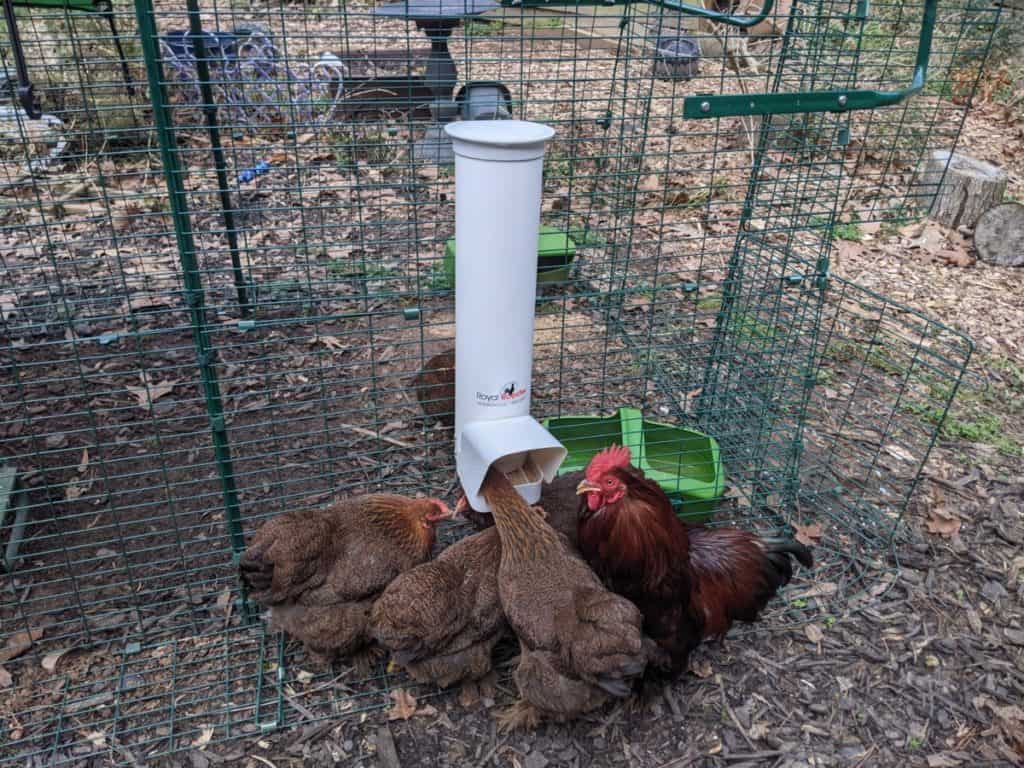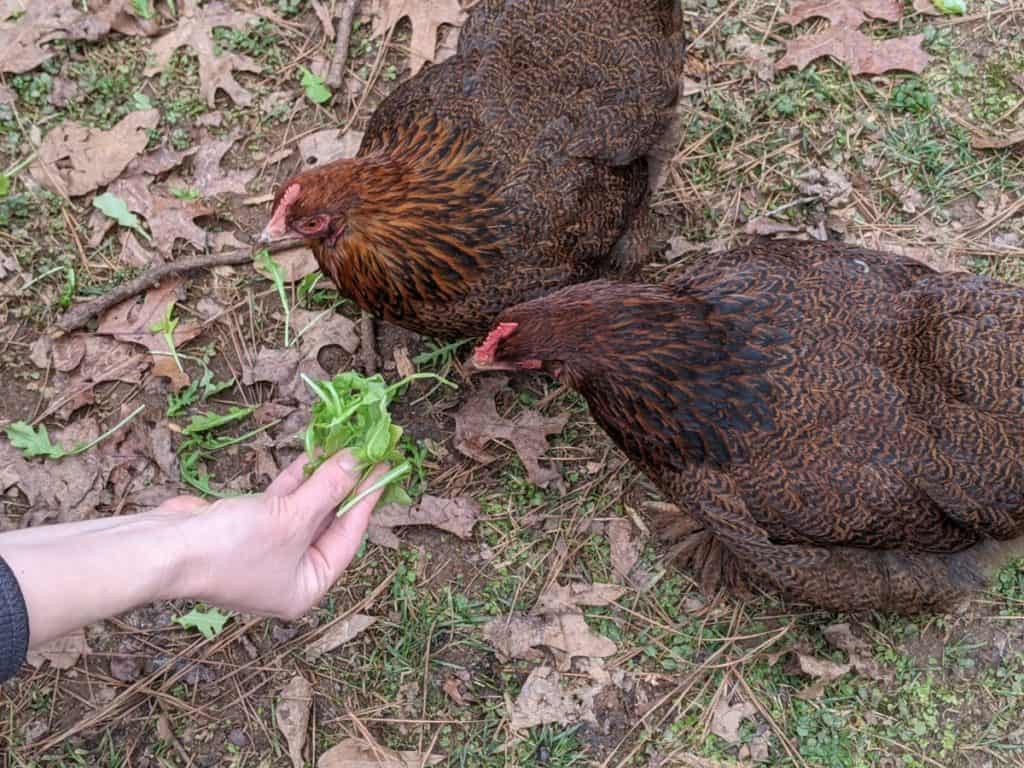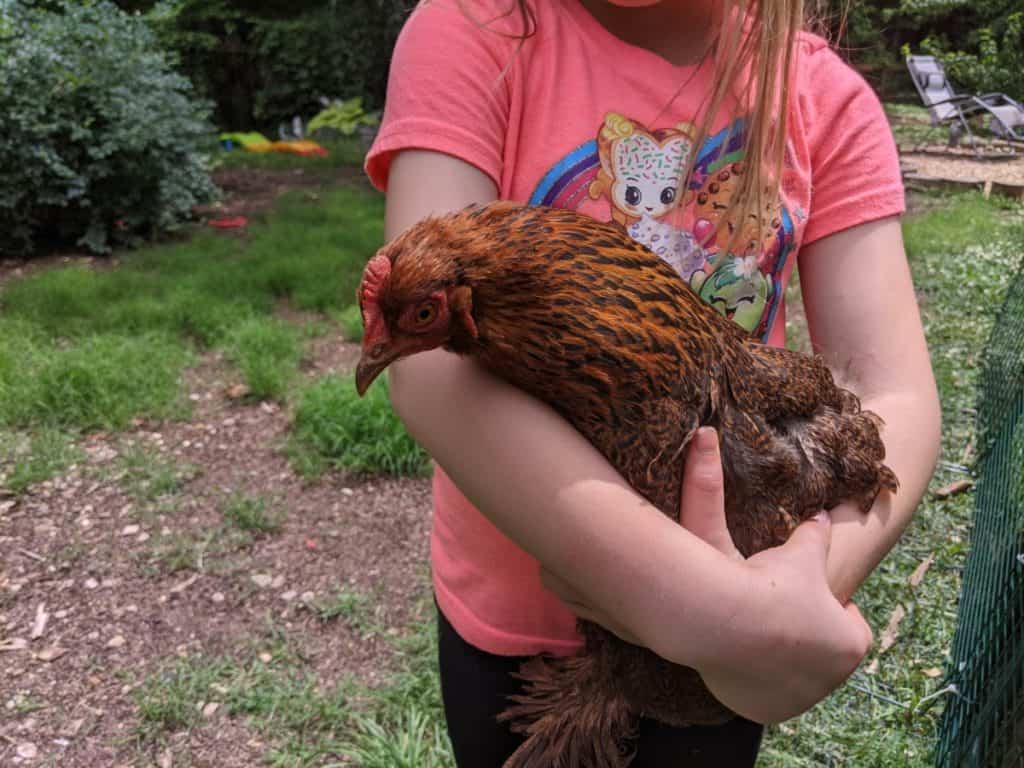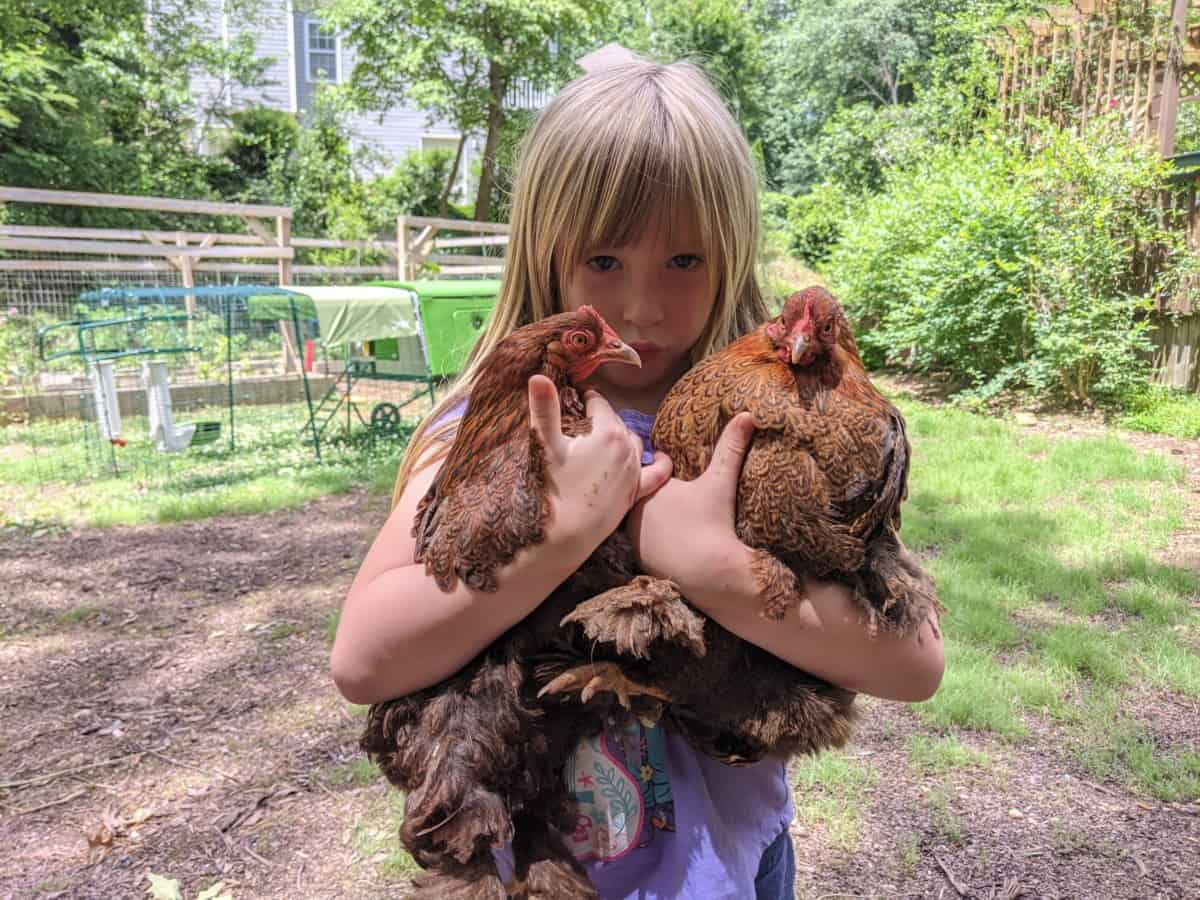It can be disheartening when you bring your chicken home, starry-eyed with the idea of your new feathered friend, and then they run away in terror every time you approach them wanting a cuddle. Try not to take it personally! Chickens are naturally skittish creatures and earning their trust takes a while.
To get chickens to trust you, feed them daily, give them lots of treats and wait for them to approach you. Spend lots of time with your chickens everyday in a quiet, calm environment. Do not make sudden movements or loud noises. Speak to chickens in a relaxed tone so that they get used to you.
Chickens are much easier to manage if they are not scared of you, and if you handle them regularly you can better keep an eye on their health. This will make your chickens more friendly overtime.
I think my hens are adorable and love when they come and sit on my lap – the ultimate sign of their trust. By dedicating time and attention to your flock, you will soon earn their trust and they will become friendly.

Create a calm environment for your flock
In their natural environment, chickens are prey animals, near the bottom of the food chain. They are naturally anxious and easily scared because this would keep them alive in the wild. It is nearly impossible to earn a chicken’s trust when they are stressed and anxious.
To get them to relax, create a quiet, calm environment for them to live. This is especially important when you first bring your new chicken home. Allow them to get used to their new environment without getting frightened.
Keep dogs, cats, and other pets away from the chickens, especially when you first get them. Even if dogs and cats are just excited and do not mean them harm, your chickens will be terrified by them. Choose a quiet area in your garden to keep the chickens contained. Loud pool pumps, barking dogs or a noisy generator will stress chickens.
Before introducing chickens to young children and pets, get the chickens to trust you first. Getting chickens can be thrilling for your toddler, but the birds will be scared by loud shrieks and wanting to hold them immediately.
For the sake of your family’s long-term relationship with your backyard chickens, get to know them and earn their trust first before trying to pick them up and introduce them to others.
Be patient. Give chickens time to get used to you. The more regularly you interact with them, the sooner they will learn to trust you and the friendlier they will become.
Trust training your chicken
If you get chicks when they are just a few days old, it will be very easy to train them to be tame. Treat them gently, with kindness from the day they meet you, and they will quickly learn that you represent safety and that they can trust you.
Chicks will soon realize that you feed them and care for them as a mother hen would and will bond to you. It feels very special when your flock communicates and interacts with you, like you are in their inner circle.
Talk to your chickens
Begin by talking to them in a soothing voice, making them aware of your presence. Chickens can learn words and phrases, so perhaps decide on something that you say to them every day.
For example, I always say “grubs up” when I bring them their food. They will learn quickly and come running!
Approach your chickens with care
Keep your distance initially and do not make sudden movements or loud sounds, as this will put them on edge.
Do not stoop over them, corner them or initially try to pick them up or touch them. Sit on the floor or stay at the chicken’s eye level to make them feel more secure. Continue speaking to them in a calm, soothing tone.
Let them come to you
Spend time around them when they are foraging and scratching. Sit still and allow their curiosity to get the better of them. Chickens are intelligent birds and will come over to check you out. They have excellent vision, so wear an interesting or sparkly item, like a bracelet or ring, to catch their attention.
Allow them to approach you on their terms. When sitting with your chickens, sprinkle cracked corn or scratching mix around you to encourage them to approach. Generally, if you sit still for just a few moments, they will come and inspect you.
The way to a chicken’s heart is through their stomach
Lastly, but most importantly – give them treats! The key to getting your chickens to trust you is by making them associate you with their favorite treats.
When trust training, give them some high-value treats that chickens love, like black fly larvae, mealworms, or cracked corn. Giving your chickens treats will make them friendly when others visit as well.
Friendly chicken breeds
Certain breeds of chickens are just not as docile as others. If you have tried everything to earn your chicken’s trust and they are still not responding, it may just be in their nature to be flighty. Rhode Island Reds, Orpingtons, Bantam Cochins, and Leghorns are known to be very friendly.

Treats can buy a chicken’s trust
There are a huge variety of treats that you can feed your chickens, and they will certainly love you for it. When chickens are confident eating treats off the ground next to you, hold your hand out and feed them. The following are safe treats for chickens:
- Grubs and bugs
- Herbs – mint, lavender, oregano, parsley, basil, thyme, cilantro
- Leafy vegetables – lettuce, kale, chard, spinach
- Pumpkins, cucumbers, beets, broccoli, carrots
- Chicken scratch grains
- Cracked corn
- Flaxseed
- Oatmeal
- Hard-boiled or scrambled egg
- Fruits – strawberries, blueberries, watermelon, citrus
- Cottage cheese
- Cooked noodles/pasta
- Grapes and raisins
- Meat scraps
- Kitchen scraps
- Green garden waste – daylilies, daisies, hostas, ferns, coneflowers, roses.
- Dandelions
What you should not feed chickens
- Salty foods
- Dried beans – contains a compound that inhibits chicken digestion
- Avocado pits and skins – toxic to chickens
- Rhubarb – toxic and gives chickens diarrhea
- Moldy or rotten food – may be toxic
- Potato peels with green bits
- Onion or garlic – they affect the egg flavor
Everything in moderation
It is important not to get carried away with feeding chickens treats, as it can negatively affect their health. Treats should only account for 10% of a chicken’s daily diet, to ensure that they still get all their nutritional needs met by their feed.
When chickens lay their first egg, they are old enough to get treats. Before then, they need all their nutrients from their chick grower feed.

How to cuddle a chicken and make them friendly
A good time to start touching or picking up a chicken is when they have gotten used to your presence and are happily clucking, foraging, and scratching around you.
They love a little scratch under their chins, and some like to be stroked on the back in the direction the feathers grow. Doing this will also make your chickens more friendly.
Without stooping over them, gently place your hands on them, over their wings, and hold them softly close to your body, placing a hand under their feet. It is best to do this sitting down. Do not hold them too tightly, as they will panic, and if they are struggling to get away, do not hold onto them against their will.
Be careful handling roosters. They can be just as cuddly as hens, but some roosters can be aggressive and have been known to attack the eyes when held close to one’s face. Explain this well to young children.
If you are scared to touch a chicken, start by wearing gloves, thick pants, and a long-sleeved shirt. Just like they will get used to you, you’ll get used to them the more time you spend together.
Do not punish chickens
Although you may feel angry and frustrated when your chickens are destroying your garden flowers or scratching up your newly planted vegetable seedlings, you should never shout at them or spray water at them to punish what they have done.
Chickens do not have the cognitive capacity to understand that they are being disciplined for doing something wrong. Punishing your flock will only hurt your relationship and degrade their trust in you.
Chicken communication
Chickens make a wide variety of sounds. Over time you will learn how your chickens communicate and what different noises mean. Speak to your chickens in a calm voice and try to copy the sounds that you hear them making when they are happy. Chickens will appreciate this and get used to you as one of the flock members.
Conclusion
By being patient with your chickens, giving them time to get used to you and their new home, and feeding them, they will learn that you are worthy of their trust and will become more friendly overtime.
Dedicate the time and effort to trust train your flock and enjoy the benefits of the special bond that will form between you.

